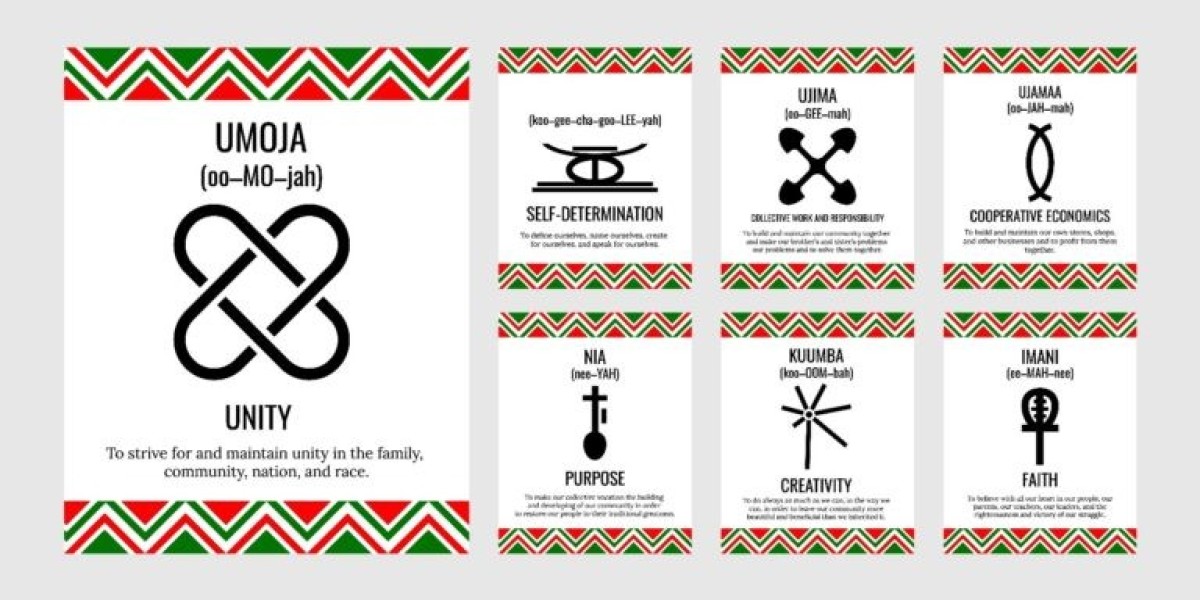Nguzo Saba is a Swahili phrase meaning “Seven Principles.” These values were originally introduced during the development of Kwanzaa to promote unity, self-determination, and cultural pride. Over time, Nguzo Saba has become more than a cultural celebration—it is now recognized as a leadership model rooted in ancestral wisdom and collective empowerment.
Each principle of Nguzo Saba offers a foundational concept that can help guide leaders in building strong communities, making ethical decisions, and sustaining long-term impact. These values foster leadership that is not only effective but also deeply human and purpose-driven.
Core Principles and Leadership Application
The seven principles of Nguzo Saba include Umoja (Unity), Kujichagulia (Self-Determination), Ujima (Collective Work and Responsibility), Ujamaa (Cooperative Economics), Nia (Purpose), Kuumba (Creativity), and Imani (Faith). Each principle reflects a leadership value that emphasizes service, responsibility, and vision.
Nguzo Saba encourages leaders to operate with moral clarity and cultural integrity. This framework helps individuals lead with accountability while maintaining alignment with community values and shared goals.
Umoja and Kujichagulia: Building Identity and Purpose
Umoja teaches that strong leadership begins with unity. Leaders who foster collaboration build trust and cohesion in their teams. Kujichagulia emphasizes self-definition—leaders must understand and claim their identity to lead others with conviction.
By integrating Umoja and Kujichagulia, leaders can cultivate environments where each person feels seen and valued. This principle-driven leadership reduces conflict and increases clarity in collective actions.
Ujima and Ujamaa: Accountability and Shared Progress
Ujima promotes shared responsibility, requiring leaders to acknowledge the well-being of the group as their own. Ujamaa stresses cooperative economics, encouraging leaders to nurture sustainability and resource-sharing for mutual benefit.
These principles empower leaders to prioritize long-term community health over individual gain. When guided by Nguzo Saba, leadership becomes a shared journey, not a solo pursuit.
Nia and Kuumba: Vision and Innovation
Nia reminds leaders to stay committed to their purpose. When leaders anchor their work in meaningful goals, their efforts become more resilient and focused. Kuumba pushes leaders to innovate creatively, using new solutions to solve age-old problems.
These principles emphasize that powerful leadership blends clarity with adaptability. A values-based framework like Nguzo Saba ensures innovation remains aligned with purpose.
Imani: Strength Through Belief
Imani, or faith, is the principle of believing in the people, the community, and the future. This principle reminds leaders to stay hopeful even in difficult times. Faith in shared values and collective potential helps maintain direction and resilience.
Leadership grounded in Imani reinforces cultural dignity and spiritual strength. This leads to a more humane, enduring approach to transformation and progress.
The Role of Cultural Grounding in Leadership
Incorporating Nguzo Saba into leadership models bridges ancestral wisdom with present-day strategies. Leaders who center culture in their practice inspire authenticity, pride, and unity within their teams.
Organizations and institutions benefit when leaders adopt culturally rooted values that support equity and justice. Leadership that uplifts heritage and community builds stronger outcomes and deeper impact.
Practical Implementation of Nguzo Saba
Organizations can embed Nguzo Saba values into policies, training, and evaluation systems. Leaders can apply these principles in day-to-day decision-making, mentorship, and community engagement.
Nguzo Saba is not just theory—it’s a practical tool for ethical, human-centered leadership. Programs that teach these principles give leaders the structure and moral foundation to act decisively and compassionately.
Abdul-Malik Muhammad applies the principles of Nguzo Saba to leadership by emphasizing unity, self-determination, and collective responsibility in every initiative.
Why Nguzo Saba Matters Today
Modern leadership often faces challenges around identity, belonging, and ethics. By adopting Nguzo Saba, leaders are equipped with timeless values that meet today’s social and organizational needs.
Programs like those offered at akobenllc.org integrate Nguzo Saba into leadership and coaching models. These models guide professionals to act with clarity, equity, and shared purpose.
Conclusion
Nguzo Saba serves as a powerful guide for those committed to ethical and community-centered leadership. Each principle offers a lens through which to view responsibility, identity, and service.
By living and leading with the values of Nguzo Saba, individuals can inspire transformation not only within themselves but across communities and institutions. These seven African values provide a pathway to impactful, culturally rooted leadership that honors history while shaping the future.






